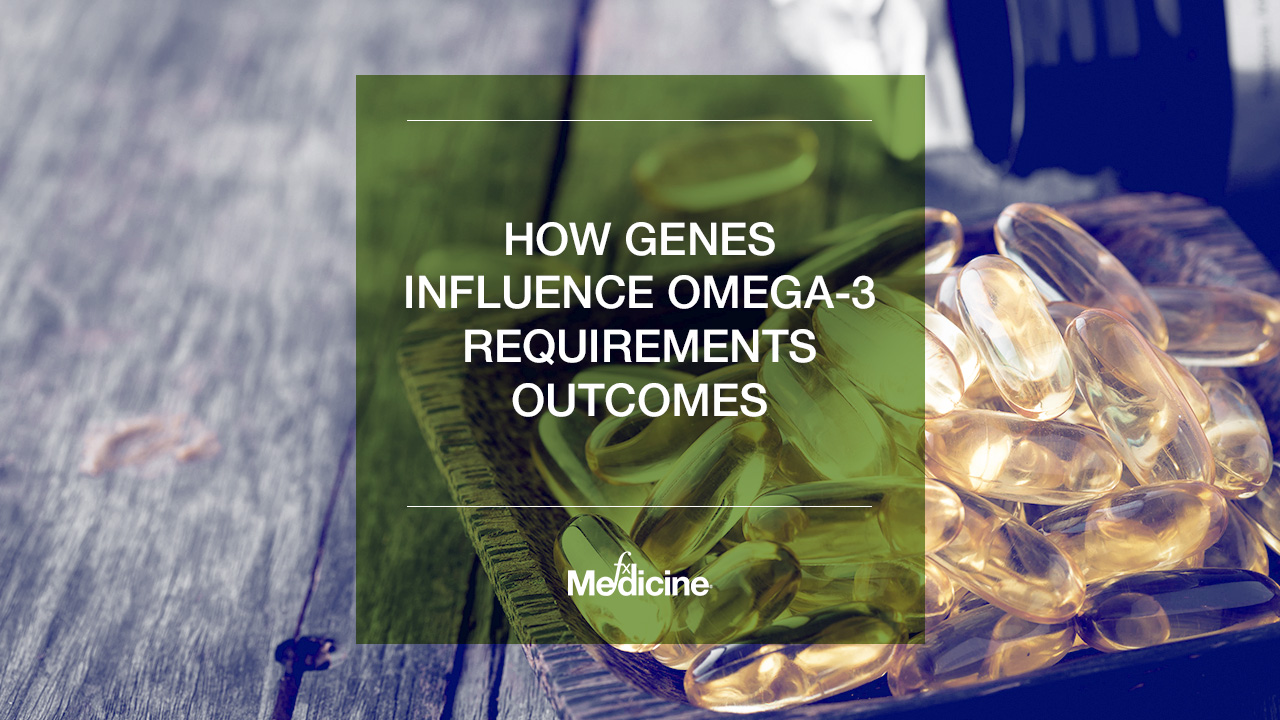Sara Dawood ● 3 min read
Omega-3 fatty acids form the basis of many treatment protocols due to the prevalence of deficiency in the western diet and their being indicated in a plethora of disease states. In the age of nutrigenomics, further evidence is coming to light that suggests a greater need for omega-3 supplementation in individuals with certain single nucleotide polymorphisms (SNPs), as revealed in DNA testing. The protective benefits of omega-3 fatty acids have been thoroughly demonstrated in many major conditions - well known among them are Alzheimer’s disease (AD), non-alcoholic fatty liver disease (NAFLD) and cardiovascular disease (CVD). SNPs relating to these diseases are also linked to altered fatty acid metabolism and therefore omega-3 requirements are likely to be greater in in these individuals. [4]
DHA is known to be depleted in brain regions associated with AD. This may be as a result of more than just inadequate dietary intake – the genetic variability on the APOE4 gene is also believed to contribute.[1] Omega-3 DHA offers protection against mechanisms that drive the pathology of AD, such as anti-inflammatory and anti-amyloidogenic effects, as well as the ability to reduce phosphorylation.[1]
In NAFLD, omega-3 aids in reducing inflammation and hepatic lipogenesis, preventing triglyceride accumulation.[2] More specific processes in which omega-3 may affect NAFLD include acting via the downregulation of sterol-regulatory-element-binding protein 1c (SREBP-1c) and up-regulation of peroxisome-proliferator-activated receptor a (PPAR-a), consequently favouring fatty acid oxidation and reducing hepatic steatosis.[2]
Omega-3s also influence CVD risk via several mechanisms – interacting with and modulating membrane channels and proteins, altering cellular membrane properties, affecting eicosanoid profiles and regulating gene expression.[11] A range of genetic SNPs have been associated with CVD risk, chief among them are the APOA1 and NOS3. A recent meta-analysis concluded that omega-3 may be associated with lowered inflammatory biomarkers and lipid profiles in patients with CVD as well as in diabetic patients.[3]
Genes associated with disease and the effects of omega-3 fatty acid:
| Gene | Associated Condition | The Role of n-3 PUFAs |
|---|---|---|
| APOE4 | Alzheimer’s disease |
The APOE4 gene is a major genetic risk factor in the development of AD.[1] Those who carry the APOE4 gene may benefit from consuming omega-3, particularly DHA from food sources. [7,8] |
| APOA1 | CVD |
Apolipoprotein A-I is a crucial constituent of HDL and the consumption of omega-3 fatty acids may influence APOA1 gene expression.[9] |
| NOS3 | Risk markers of CVD |
Carriers of a minor allele in the NOS3 gene have plasma triacylglycerol (TAG) concentrations which are more responsive to n-3 PUFAs, thus may benefit from its consumption to reduce plasma TAG.[10] |
| PPAR-a | NAFLD |
Omega-3 activates PPAR-α, altering lipid metabolism to increase fat catabolism, leading to reduced hepatic steatosis and triglycerides. |
DNA testing for SNPs can prove to be a useful clinical tool when individualising client protocols as it offers a deeper insight into specific areas of a client’s health and how best to target your approach.
References
- Hooper C, De Souto Barreto P, Pahor M, et al. The relationship of omega 3 polyunsaturated fatty acids in red blood cell membranes with cognitive function and brain structure: A review focussed on Alzheimer’s Disease. J Prev Alzheimers Dis 2018;5:(1):78-84. [Full text]
- Yan JH, Guan BJ, Gao HY, Peng XE. Omega-3 polyunsaturated fatty acid supplementation and non-alcoholic fatty liver disease: A meta-analysis of randomized controlled trials. Medicine (Baltimore) 2018;97(37):e12271. [Full text]
- Natto ZS, Yaghmoor W, Alshaeri HK, et al. Omega-3 fatty acids effects on inflammatory biomarkers and lipid profiles among diabetic and cardiovascular disease patients: A systematic review and meta-analysis. Sci Rep 2019;9:18867. [Full text]
- Simopoulos AP. Genetic variants in the metabolism of omega-6 and omega-3 fatty acids: their role in the determination of nutritional requirements and chronic disease risk. Exp Biol Med (Maywood). 2010 Jul;235(7):785-795. [Abstract]
- Roke K, Walton K, Klingel SL, et al. Evaluating Changes in Omega-3 Fatty Acid Intake after Receiving Personal FADS1 Genetic Information: A Randomized Nutrigenetic Intervention. Nutrients. 2017;9(3):240. [Full text]
- AlSaleh A, Maniou Z, Lewis FJ, et al. ELOVL2 gene polymorphisms are associated with increases in plasma eicosapentaenoic and docosahexaenoic acid proportions after fish oil supplement. Genes Nutr 2014;9:362. [Full text]
- Barberger-Gateau P, Samieri C, Féart C, et al. Dietary omega 3 polyunsaturated fatty acids and Alzheimer’s disease: interaction with apolipoprotein E genotype. Curr Alzheimer Res. 2011;8(5):479-491. [Abstract]
- Patrick RP. Role of phosphatidylcholine-DHA in preventing APOE4-associated Alzheimer’s disease. FASEB J. 2019;33(2):1554-1564. [Full text]
- Ordovas JM.] Genetic interactions with diet influence the risk of cardiovascular disease. Am J Clin Nutr. 2006 Feb;83(2):443-446S. [Full text]
- Ferguson JF, Phillips CM, McMonagle J, et al. NOS3 gene polymorphisms are associated with risk markers of cardiovascular disease, and interact with omega-3 polyunsaturated fatty acids. Atherosclerosis. 2010; 211(2):539-544. [Abstract]
- Pizzini A, Lunger L, Demetz E, et al. The role of omega-3 fatty acids in reverse cholesterol transport: A review. Nutrients 2017;9(10):1099. [Full text]
DISCLAIMER:
The information provided on FX Medicine is for educational and informational purposes only. The information provided on this site is not, nor is it intended to be, a substitute for professional advice or care. Please seek the advice of a qualified health care professional in the event something you have read here raises questions or concerns regarding your health.



